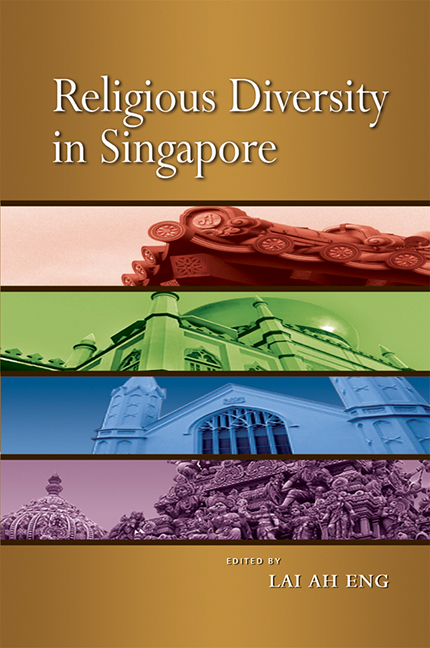Book contents
- Frontmatter
- Contents
- List of Figures and Tables
- List of Appendices
- FOREWORD
- PREFACE
- Acknowledgements
- The Contributors
- Abbreviations
- Glossary
- INTRODUCTION
- PART I The Landscape of Religious Diversity
- PART II Religion in Schools and Among the Young
- PART III Religion in the Media
- PART IV Religious Organizations in Social Services
- PART V Interfaith Issues and Interaction
- 23 Religious Diversity, Toleration and Interaction
- 24 Negotiating Christianity with Other Religions: The Views of Christian Clergymen in Singapore
- 25 The Inter-Religious Organization of Singapore
- 26 Interactions among Youth Leaders of Different Faiths: Realities from the Ground and Lessons Learnt
- 27 Building Bridges between Christians and Muslims: A Personal Journey
- 28 Conclusion: Some Remarks on Religious Diversity in Singapore
- Index
24 - Negotiating Christianity with Other Religions: The Views of Christian Clergymen in Singapore
from PART V - Interfaith Issues and Interaction
Published online by Cambridge University Press: 21 October 2015
- Frontmatter
- Contents
- List of Figures and Tables
- List of Appendices
- FOREWORD
- PREFACE
- Acknowledgements
- The Contributors
- Abbreviations
- Glossary
- INTRODUCTION
- PART I The Landscape of Religious Diversity
- PART II Religion in Schools and Among the Young
- PART III Religion in the Media
- PART IV Religious Organizations in Social Services
- PART V Interfaith Issues and Interaction
- 23 Religious Diversity, Toleration and Interaction
- 24 Negotiating Christianity with Other Religions: The Views of Christian Clergymen in Singapore
- 25 The Inter-Religious Organization of Singapore
- 26 Interactions among Youth Leaders of Different Faiths: Realities from the Ground and Lessons Learnt
- 27 Building Bridges between Christians and Muslims: A Personal Journey
- 28 Conclusion: Some Remarks on Religious Diversity in Singapore
- Index
Summary
INTRODUCTION
Christianity has steadily increased its presence in Singapore in the last few decades, currently accounting for approximately 14 per cent of the population (Leow 2001). Much of the growth has been within the Pentecostal, Charismatic and evangelistically oriented branches of the Christian church (Mathews 1999; Tong 1989). This more fervent branch of the Singapore church has, to a great extent, been influenced by the growth of American Conservative Protestantism which has spread its reaches into much of Asia, Africa and Latin America (Cox 1995; Walls 1996).
Conservative Protestantism has earmarked itself with its high view of Biblical literalism, as opposed to the more subjective reading of fast-declining liberal Christianity (Hunter 1987; Marsden 1980; Woodberry and Smith 1998). This fundamental epistemological position which seeks to speak “truth”, sometimes in absolute terms, has often been interpreted as a tendency towards intolerance (Kirkpatrick 1993). While research is inconclusive, there has been substantial research that suggests that conservative groups of Christians are generally more intolerant of selective groups, especially those with different sexual orientations or from different religious traditions (Gay and Ellison 1993; Smith 1996). It is thus not surprising why many religious groups within multi-religious Singapore are concerned with the growing Christian church since it leans towards a conservative position.
This research project aims to examine Christianity and how it relates to other religions in this multi-religious nation-state. It focuses on the views of Christian clergymen since they represent “authorities of delimitation” who frame the discourse for their church going members (Foucault 1972). The views of these clergymen on four areas are shown here: inter-religious dialogue and inter-religious relations which are potential sites for developing religious harmony; and evangelism practices and the non-participation of Christians in non-Christian rituals which are possible sites of inter-religious tension. In dealing with these clergymen's views, I attempt to detail the diversity of opinions and examine underlying factors which could motivate their different viewpoints.
METHODOLOGY
Data for this project was obtained through a combination of in-depth interviews and self-administered surveys conducted with clergymen from a variety of denominations and independent churches. The survey and interviews covered the following four broad areas: the acceptability of interreligious dialogue; collaborative decisions with other religious groups; evangelistic practices; and participation in non-Christian rituals (see Appendix 24.1 for details).
- Type
- Chapter
- Information
- Religious Diversity in Singapore , pp. 571 - 604Publisher: ISEAS–Yusof Ishak InstitutePrint publication year: 2008

